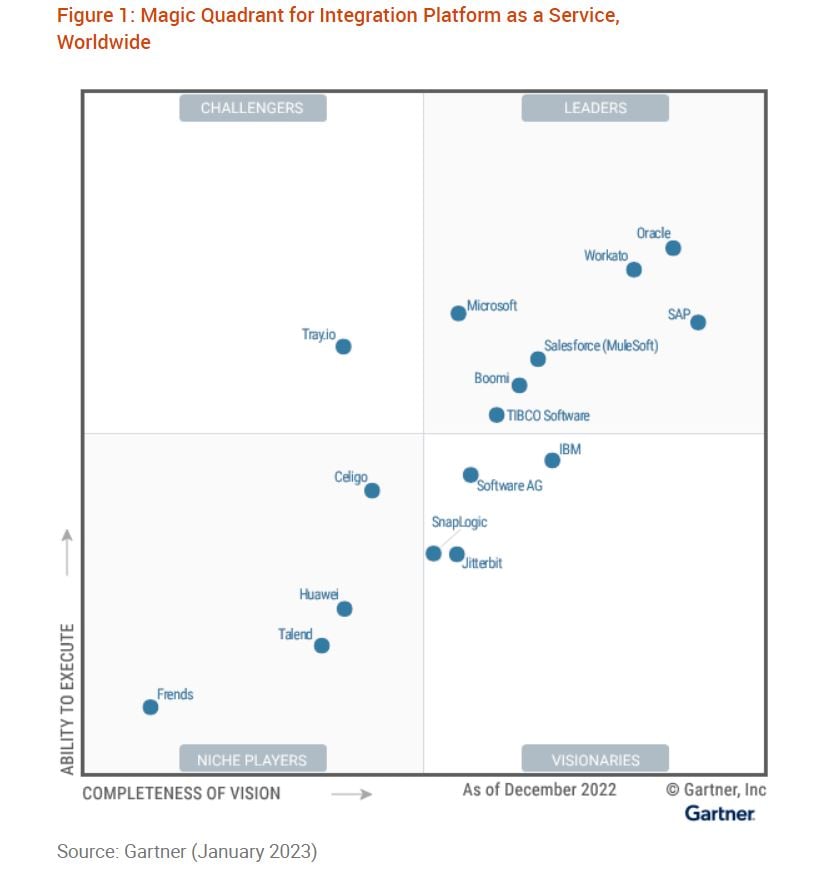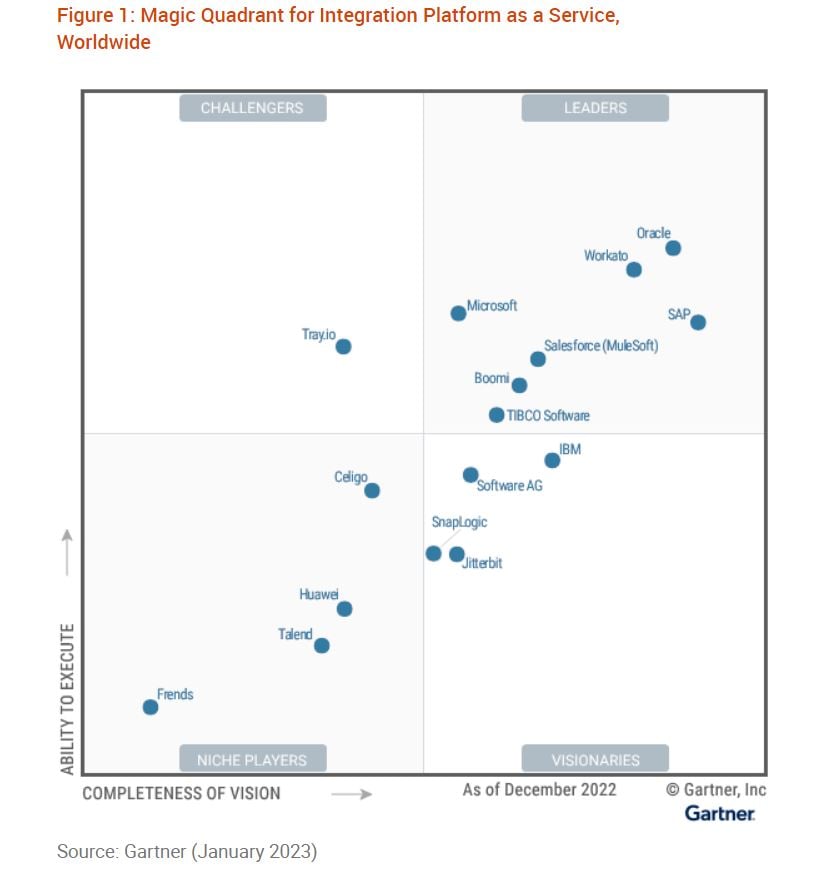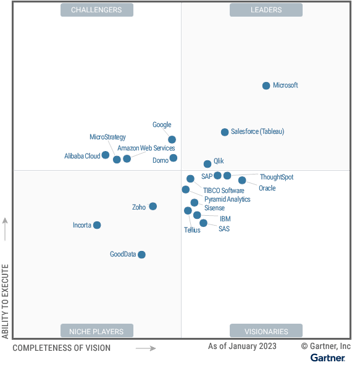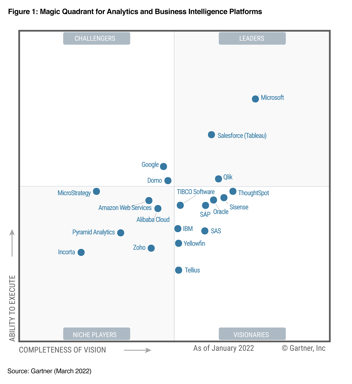Microsoft is positioned as a leader in Gartner's Magic Quadrant for Integration Platforms as a Service (iPaaS) 2023.
After ranking Power BI at the top of the latest Gartner Magic Quadrant for BI and Analytic Platforms 2023, Gartner has now also recognised Microsoft as a leader in the field of data integration and system integration.
Gartner has just named Microsoft as the leader in the latest Gartner Magic Quadrant for Integration Platforms as a Service (iPaaS) 2023, thanks to Azure integration services.

If you work in the IT sector, you may already be familiar with Gartner's Magic Quadrant, as it is one of the most influential IT market research reports worldwide.
However, let's take a brief look at what it is and how it works.
What Is Gartner's Magic Quadrant and Why is it important
Garnter's Magic Quadrant is a unique graphical report that evaluates and ranks the world's leading technology and IT software vendors. The report is the result of an extensive market research conducted by Gartner, a world-renowned consulting firm.
Gartner produces and publishes a Magic Quadrant for each sector of the technology industry, covering more than 100 different categories. This comprehensive and specialised approach makes it a respected authority in the technology and business community, and its findings influence the IT sourcing decisions and sales strategies of companies in the sector.
How does it work
Gartner's Magic Quadrant classifies leading technology vendor companies into four distinct categories: Leaders, Visionaries, Niche Players and Challengers. The US consultancy evaluates companies based on two key criteria: their vision and their ability to realise their vision through effective execution.
Gartner's Magic Quadrant for Integration Platform as a Service (iPaaS) 2023

The results of the latest Gartner Magic Quadrant for Business Intelligence and Analytics Platforms 2023 are clear: Microsoft is positioned as the clear leader in the quadrant alongside Oracle, Workato and SAP. In particular, Microsoft takes the lead thanks to the integration capabilities of the Azure ecosystem.
What are Integration Platform as a Service (iPaaS)?
Gartner defines integration platforms as a service (iPaaS) as a provider-managed cloud service that enables end users to implement integrations between various applications, services and data sources.
In other words, tools that integrate and connect different APIs, services and data sources, enabling seamless data flow between them all.
In terms of their business use cases, Gartner highlights three main functionalities:
- Consistency across all data assets to ensure that applications are working with the correct information.
- Automating business processes and workflows.
- Creation of exposed services such as APIs or events.
According to Gartner, integration platforms as a service "accelerate time to value and reduce operational challenges across many use cases".
Integration Platform as a Service (iPaaS): Core capabilities
Gartner's Magic Quadrant for Integration Platforms as a Service (iPaaS) is the result of a ranking that includes 16 different software vendors. For the selection of these 16 players, Gartner considers that there are a number of requirements that all iPaaS must meet.
Specifically, they mention 6 basic requirements:
- It must be a cloud service.
- It must be fully managed by the provider.
- It must provide developer tools that enable end users to implement integration use cases.
- It must provide software development life cycle (SDLC) tools to enable SDLC management, including versioning, testing and deployment.
- It must provide operational tools to enable operational monitoring, alerting, reporting and auditing of running integrations, processes, pipelines and services in production environments.
- Enable at least one of the following use cases for integration technology:
- Data consistency: Ability to monitor or receive notifications from applications, services and data sources in case of changes and to propagate these changes to the appropriate applications and data destinations (e.g. "synchronise customer data" or "ingest into data lake").
- Multi-step processes: Ability to implement multi-step processes between applications, services and data sources (e.g. 'on-board employee' or 'process insurance claim').
- Composite service: Ability to create composite services exposed as APIs or events and composed from existing applications, services and data sources (e.g. to create a "credit check" service or to create a "generate fraud score" service).
Why Microsoft Azure is a Leader in Gartner's Magic Quadrant for Integration Platforms (iPaaS) 2023
As we have already mentioned, Microsoft tops the Gartner Magic Quadrant for Integration Platforms as a Service (iPaaS) thanks to the extensive interoperability and integration capabilities of Azure Integration Services.
Azure Integration Services ecosystem includes:
- Azure Logic Apps: for creating workflows and business processes.
- Azure API Management: for API management.
- Azure Service Bus: message queuing and publish-subscribe service.
- Azure Event Grid: mass event ingestion service.
- Azure Functions: service for serverless and event-based functions.
- Azure Data Factory: for data integration.
Overall, Gartner positively highlights that "Microsoft rolls out features globally for all user personas and continues to enhance its partner network across all regions in support of its integration offerings."
Strenghts
In terms of the strengths of Microsoft Azure Integration Services, Gartner highlights:
- Transformation in the technology sector: Azure Integration Services has experienced incredible growth in monthly processing volume year-over-year, demonstrating a strong financial position and confirming its strategic role in Microsoft's product portfolio. In addition, the increase in the number of customers and revenue shows that existing users are increasingly taking advantage of the platform.
- Collaborative innovation: Azure Integration Services offers a unique collaborative experience in its design, development and maintenance, allowing users to access, create and share solutions across the organisation and across devices. This fosters collaboration and agile teamwork, driving innovation in the use of technology.
-
High responsiveness to market demands: Microsoft has proactively responded to the API-first integration trend by enhancing key API management features in Azure Integration Services. This includes an open source API portal, monitoring and observation tools, Azure API Management (APIM) integration with Key Vault, API debugging and troubleshooting capabilities, and the ability to use API Management extensions for Visual Studio Code to generate Azure Functions for serverless computing. These enhancements demonstrate Microsoft's ability to quickly adapt to market needs and deliver advanced solutions to empower software engineers in organisations.
Cautions
In terms of cautions or weaknesses of Azure Integration Services, Gartner mentions the following three points:
- Industry strategy: While Microsoft's industry-specific offering is adequate, it lags behind its competitors in terms of line-of-business (LOB) connector support and application areas such as ERP, CRM and HCM.
- Product strategy: Microsoft has limited plans to extend or enhance its business integration capabilities such as managed file transfer, electronic data interchange (EDI), IDP, decision automation and MXDP.
- Sales strategy: Microsoft's sales strategy spans multiple channels that seek to reach IT and development decision-makers through Azure Integration Services, as well as offering a low-code offering through its Power Platform for business users. However, this dual go-to-market strategy can result in uncoordinated sales approaches and disregard PIPs (Priority Innovation Projects) for accelerated delivery.
As a Microsoft Power BI partner and Microsoft Gold Partner since our beginnings, at Bismart we are pleased that Gartner confirms once again that we work with the best integration tools and ecosystems on the market. This confirmation allows us to ensure that we develop our business solutions with the latest technology and that we are offering the best capabilities and guarantees in the market to our customers.



